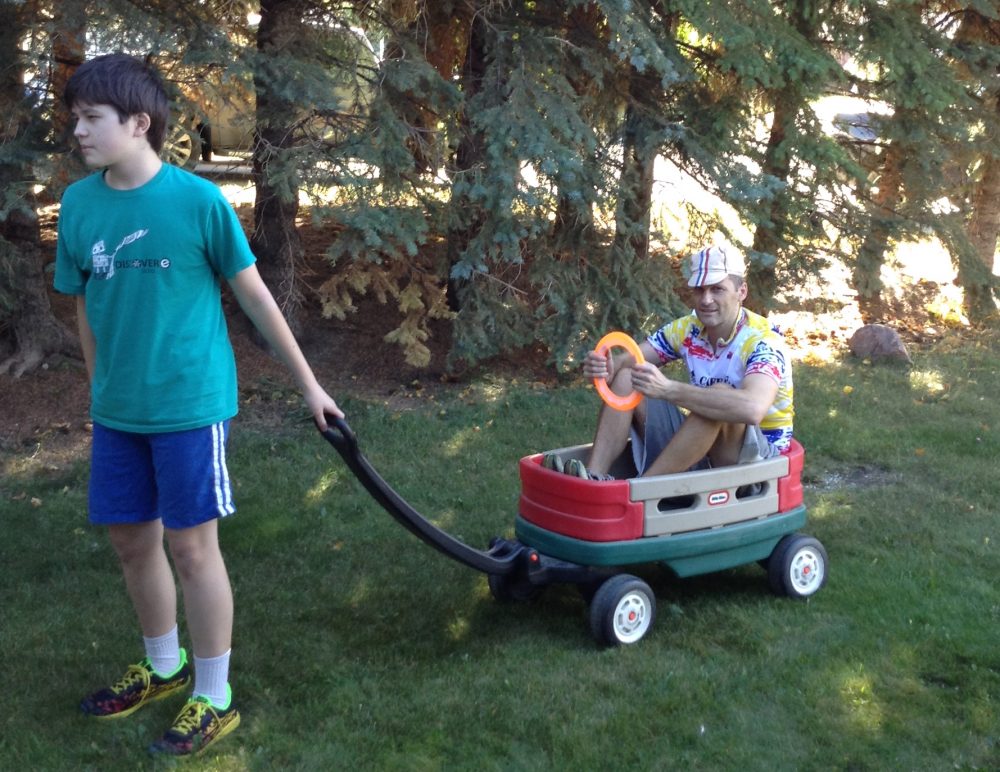My wife is part of a Chinese educational organization, and sometimes she receives some perks as a reward for good service and being part of their family. And being a generous woman, she receives these graciously and then promptly gives them to her immediate family … namely, us. It is a good deal.
This week, she received two free tickets to the new movie Kung Fu Panda 3, and she thought it would be a good idea if I would go with my youngest son. It was an afternoon showing on a Saturday, which meant that it fit into my schedule – as long as I get a chance to ride my stationary bike in the morning, I am ready and able to do anything else for the rest of the day. So, fresh off a 2+ hour excursion on my metal steed of torture, and with my tummy full of a meatball sandwich (thank you, honey), off we went to the nearby theatre to take advantage of this free movie – which, by the way, is my favourite kind of movie of all.
When we got there, we were beset with the first and most important challenge: where to sit? This is no easy decision, and so we stood there at the entrance for a good little while considering the options. Much like Sheldon explaining his ideal sitting location in his apartment, it might seem an overly complicated process to the uninitiated. If the seat is too high up, the screen is too far away, but if the seat is too low, the screen is so large it is tough to take it all in at once. It cannot be too far to either side, since you would be seeing the screen at an angle and not getting the optimal picture. A good distance from young children is ideal, since they tend to talk and scream at all the wrong moments – in fact, any loud people are well avoided, if you have the power.
We decided on the middle seats a few rows up from the front, and one might think that this was too close, but I found that when I leaned back, the back rest flexed nicely and placed my head and neck at the perfect angle to view the screen. Great start!
Just before the movie started, though, I thought that this perfect outing would be ruined beyond all repair. A voice came on the intercom and told us that the movie we were watching was 3D and that if we hadn’t picked up our glasses yet, we were to venture back to the entrance and pick them up. I groaned out loud. Because one of my eyes is not as strong as the other, I have very poor depth perception and up until this point, I have never been able to see any 3D movie properly. They end up being blurry, fuzzy-coloured messes. Did this mean that I would be spending a full 95 minutes in complete frustration? But I was with my youngest son and I did not want to ruin his watching experience, and so I resolved to make the most of it. I went with him to the entrance and grabbed a pair of glasses, secretly convinced that this was a complete waste of time. But hey, I didn’t want to be the one guy who was not wearing the glasses. This would only lead to undue attention and again, it might cause my son to feel uncomfortable and begin to sympathize with me. Definitely not something I wanted him to experience.
So, we returned to our seats and in a while, the movie began. I put the glasses on, expecting to be disappointed once again, but lo and behold, a miracle occurred. The disparate images from my left and right eye coalesced within my brain and the screen exploded with depth. Some characters were further away, while others were very close – in fact, some of them were hanging out in the space between the screen and me, close enough for me to touch. Leaves swirled in the virtual air, bubble floated to cover the first three rows of the theatre, and there were moments where I was struck with vertigo because I felt like I was on the edge of a cliff and about to fall. It was like seeing for the first time. I laughed aloud in delight, and in fact, I did it so loudly at times that I had to shut myself up before I completely embarrassed myself. I am watching a show with a bunch of young kids, and I was acting more like a kid than they were. I was spellbound, starstruck, and transfixed, all at the same time.
Admittedly, the movie was not the greatest – if I had seen it in 2D, it would have been merely okay. But the 3D element made it magical and I loved the entire movie. I was constantly looking for signs of depth and I was never disappointed. In the past, such movies would only have moments of 3D, inserted at times as more of shock value, but this movie incorporated 3D for its entirety. I didn’t realize that such quality was possible.
I have always been the kind of guy who preferred to watch movies at home. Why go to a theatre to watch something that I could just as easily watch at home with my own theatre system? All I need is a bit of patience and wait for its release on DVD or Blu-Ray. But now, I am not so sure. I can’t help but wonder when the next 3D animated movie is coming out, because I might just want to be there to be amazed once again. I can only hope that my wife will score some free tickets for that one as well.
